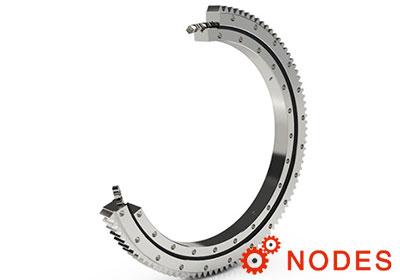1, Review the APPLICATION INFORMATION before proceeding with bearing selection.
2, Determine the maximum bearing loads. These loads must include all dynamic and static loads imposed on KAYDON bearing. The loads in turn must be transposed to loads acting at the bearing’s center.
Some specific items to consider are:
All applied forces to the bearing and gear. Not only the rated and working loads but also those that may occur when equipment is at rest, such as that due to wind for larger structures.
Loads imposed during overload or testing situations.
Loads imposed during assembly or disassembly.
Weights of all members of the structure which are supported by KAYDON bearing.
All possible combinations of maximum loads. A crane, for example, usually has a number of conditions of load versus working radii, both during use and at time of overload testing.
3, Multiply the calculated loads by the applicable service.
4, If an integral gear is desired, determine the required gear capacity. As with the bearing loads, consideration must be given to all conditions that would generate potential gear loads; some examples include those while working, static, on incline, and overload testing. One must also consider the duty cycle at each of these conditions.
5, Determine the preferred mounting arrangement, considering the pinion and gear location as well as installation and continued maintenance of the bearing and retaining bolts.
6, Make a preliminary selection by comparing the previously calculated bearing loads, including service factor, to the bearing’s load rating curve. Ensure that all load combinations are below the curve. In many cases there will be a choice of several bearings meeting the required load ratings.
7, If applicable, check the gear rating of the selected bearing.
8, Confirm that the mounting bolts, mounting plates, and joint arrangements are suitable for the installation.
9, The Kaydon bearing you select must meet your design requirements.







